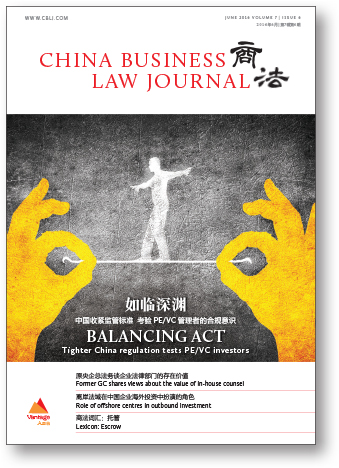Don’t fret if you think you’ve got the wrong magazine this month – it’s still China Business Law Journal, but your old friend has had a facelift! We hope you enjoy our elegant new look, and hope that it adds to your pleasure in reading our content. Drop us a line and let us know what you think.

In a male-dominated legal community, Performance artistry features Huang Rui, a female legal veteran who recently stepped down as general counsel of China General Consulting & Investment, a central government-owned company.
Admittedly, corporate counsel have trouble saving time for their business teams, so how much they help increase corporate efficiency can often determine their value, she says.
Huang shares her experiences in team management and what capabilities in-house counsel need to develop. For her, legal work brings the same joy as that of performing art.
Huang thinks corporate counsel need to develop at the very least three capabilities: case handling, project negotiation and legal training.
On that basis, she thinks that in-house counsel can develop two further abilities on their career path – the ability to provide legislative advice, and the ability in the alternative dispute resolution sector, such as arbitration and mediation.
Competition is growing fierce in China’s domestic market, with more multinationals investing here. Finding the right platform is vital to Chinese companies seeking to diversify their investment overseas, and for many, offshore centres are their answer.
Lots more offshore finds that while tax planning has been a traditional call, overseas investment and asset management have become stronger drivers for Chinese interest in offshore platforms. But before a right choice can be made, Chinese companies and investment funds need to grasp the unique features of each offshore jurisdiction. We help you to decipher the new landscapes in some of the most popular offshore centres.





















